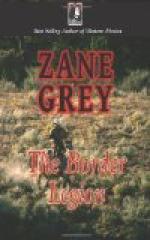“You’re a strange girl to live out here on this border,” he said.
“I’m no different from other girls. You don’t know girls.”
“I knew one pretty well. She put a rope round my neck,” he replied, grimly.
“A rope!”
“Yes, I mean a halter, a hangman’s noose. But I balked her!”
“Oh! ... A good girl?”
“Bad! Bad to the core of her black heart—bad as I am!” he exclaimed, with fierce, low passion.
Joan trembled. The man, in an instant, seemed transformed, somber as death. She could not look at him, but she must keep on talking.
“Bad? You don’t seem bad to me—only violent, perhaps, or wild. ... Tell me about yourself.”
She had stirred him. His neglected pipe fell from his hand. In the gloom of the camp-fire he must have seen faces or ghosts of his past.
“Why not?” he queried, strangely. “Why not do what’s been impossible for years—open my lips? It’ll not matter—to a girl who can never tell! ... Have I forgotten? God!—I have not! Listen, so that you’ll know I’m bad. My name’s not Kells. I was born in the East, and went to school there till I ran away. I was young, ambitious, wild. I stole. I ran away—came West in ’fifty-one to the gold-fields in California. There I became a prospector, miner, gambler, robber—and road-agent. I had evil in me, as all men have, and those wild years brought it out. I had no chance. Evil and gold and blood—they are one and the same thing. I committed every crime till no place, bad as it might be, was safe for me. Driven and hunted and shot and starved—almost hanged! ... And now I’m—Kells! of that outcast crew you named ‘the Border Legion!’ Every black crime but one—the blackest—and that haunting me, itching my hands to-night.”
“Oh, you speak so—so dreadfully!” cried Joan. “What can I say? I’m sorry for you. I don’t believe it all. What—what black crime haunts you? Oh! what could be possible tonight—here in this lonely canon— with only me?”
Dark and terrible the man arose.
“Girl,” he said, hoarsely. “To-night—to-night—I’ll. ... What have you done to me? One more day—and I’ll be mad to do right by you— instead of wrong. ... Do you understand that?”
Joan leaned forward in the camp-fire light with outstretched hands and quivering lips, as overcome by his halting confession of one last remnant of honor as she was by the dark hint of his passion.
“No—no—I don’t understand—nor believe!” she cried. “But you frighten me—so! I am all—all alone with you here. You said I’d be safe. Don’t—don’t—”




